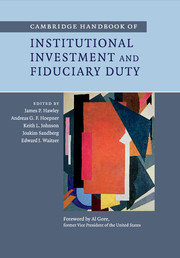Book contents
- Frontmatter
- Contents
- List of figures
- List of tables
- List of contributors
- Foreword
- 1 Introduction
- Part I Fiduciary duty: a global outlook
- 2 The public fiduciary: a Canadian perspective
- 3 The basis of fiduciary duty in investment in the United States
- 4 Governance and accountability in UK pension schemes
- 5 Institutional investment and fiduciary duty in Australia
- 6 The regulation of institutional investment in Sweden: a role model for the promotion of responsible investment?
- 7 The Dutch pension system
- Part II Fiduciary duty and the landscape of institutional investment
- Part III Challenging conventional wisdom on fiduciary duty
- Part IV Towards a broader interpretation of fiduciary duty
- Part V Beneficiaries’ roles and viewpoints
- Part VI Fiduciary duty and governance
- Index
- References
3 - The basis of fiduciary duty in investment in the United States
Published online by Cambridge University Press: 05 April 2014
- Frontmatter
- Contents
- List of figures
- List of tables
- List of contributors
- Foreword
- 1 Introduction
- Part I Fiduciary duty: a global outlook
- 2 The public fiduciary: a Canadian perspective
- 3 The basis of fiduciary duty in investment in the United States
- 4 Governance and accountability in UK pension schemes
- 5 Institutional investment and fiduciary duty in Australia
- 6 The regulation of institutional investment in Sweden: a role model for the promotion of responsible investment?
- 7 The Dutch pension system
- Part II Fiduciary duty and the landscape of institutional investment
- Part III Challenging conventional wisdom on fiduciary duty
- Part IV Towards a broader interpretation of fiduciary duty
- Part V Beneficiaries’ roles and viewpoints
- Part VI Fiduciary duty and governance
- Index
- References
Summary
Introduction
Any person concerned with issues of institutional investment must understand the various roles that apply to those who undertake financial responsibilities in this field. Such a project should begin with an understanding of fiduciary duty in investment.
At its core, the concept of fiduciary duty is simple. Whatever the particular duties with which a fiduciary may be charged, the basis of all fiduciary responsibility is found in a common human sense, emanating from the nature of the relationship that the fiduciary has with a beneficiary. The fiduciary, who often works under the moniker of trustee, takes on a responsibility to look after assets belonging to beneficiaries. Viewed from the outside, the fiduciary appears to be the owner of the assets, but in fact, his or her leeway for activity is significantly constrained. Each and every decision made by the fiduciary must be made in the interests of the real owner of the assets, the beneficiary. The fiduciary must be loyal to the beneficiary alone and is obliged to be impartial in protection of his or her interests. The fiduciary’s action may not be contrary or adverse to the interests of the beneficiary, whether for his or her own benefit or for the benefit of any nonbeneficiary, and must avoid any situation in which the personal interests of the fiduciary and the interests of the beneficiaries could clash. Other attributes of common sense apply, especially as fiduciary duties must always be exercised in certain historical, investment and political climates.
- Type
- Chapter
- Information
- Publisher: Cambridge University PressPrint publication year: 2014
References
- 2
- Cited by

